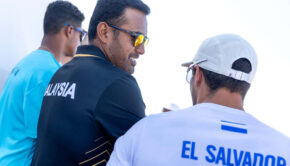Care and Feeding of Race Volunteers
Published on January 12th, 2014
Tom Duggan, ISAF International Race Officer and US SAILING National Race Officer, provides advice for clubs struggling to recruit, train and hold the attention of volunteer race officers…
This is my favorite topic. I have given talks on this subject to both sailing and business groups. And I always start the same way, “I’m not going to tell you anything here that you don’t deep down inside already know.”
When people volunteer their time, to either be part of a racing crew, or part of a race management team- they must feel rewarded. Otherwise why would they volunteer? In most cases in sailing, we cannot reward with money – so we need other currency. It always impresses me to see the kind of people we have working on the water for free – doctors, engineers, lawyers, business leaders, etc. These people can buy their own drinks- they don’t give up a day’s (or several days’) income or vacation time for a couple of drink tickets. So what’s the currency they are willing to trade their time for?
I think it is appreciation, hard work that results in accomplishment, and challenge – and the fun that comes from all of that.
The hard work (and it is just hard work, not magic) is creating an environment that fosters individual and team successes among your volunteers. This is done through leadership. And I mean leading, not ordering people around. Recently I saw two drawings that contrasted leadership styles. One drawing was of a group of ancient workers with a rope, pulling a block of stone up a ramp- the boss standing on the block, yelling instructions. The other was of the same group- the boss holding the rope, pulling and collaborating with his men. Who would you be more willing to contribute more effort for, to be more willing to learn new skills for, to ‘up your game’ for? Like I said previously, nothing here you don’t already know.
Why don’t more people lead this way? I don’t know – maybe because quite often the rewards aren’t as obvious – or as immediate. It takes more time, effort and patience to develop volunteers who can work on their own than it does to just tell them what to do. More work for the group leader, yes – but team members need to feel ownership in order to extend their best efforts. Remember, in the entire history of the world, no one has ever washed a rented car.
Every organization has members who fit the leadership profile. They don’t necessarily need to be the best race managers – they just need to be allowed to work to develop them.
I do enjoy being the ‘Pied Piper’ PRO brought in to a club to help manage a high level event that a club might not be ready to handle on its own. But a large part of the ‘Pied Piper’ gig is teaching. Clubs often ask me, “Can you bring some people in with you because we are not quite sure we have enough experience to support you.” My response is always, “Not unless I absolutely have to. How will your people learn if we don’t let them try?” It’s the Catch 22 that we’ve got to overcome when developing volunteers. They have to stretch to truly learn. We have to have the nerve to let them stretch. Sometimes a club will be offered an event that is a bit of a reach for its volunteers. That’s the perfect situation to bring in an accomplished PRO to help. But clubs who do this should make sure that the race officer they bring in is truly willing to put the effort into leaving something valuable behind- not just a plaque to hang on the wall.
Click here for the complete interview with Tom Duggan.









 We’ll keep your information safe.
We’ll keep your information safe.